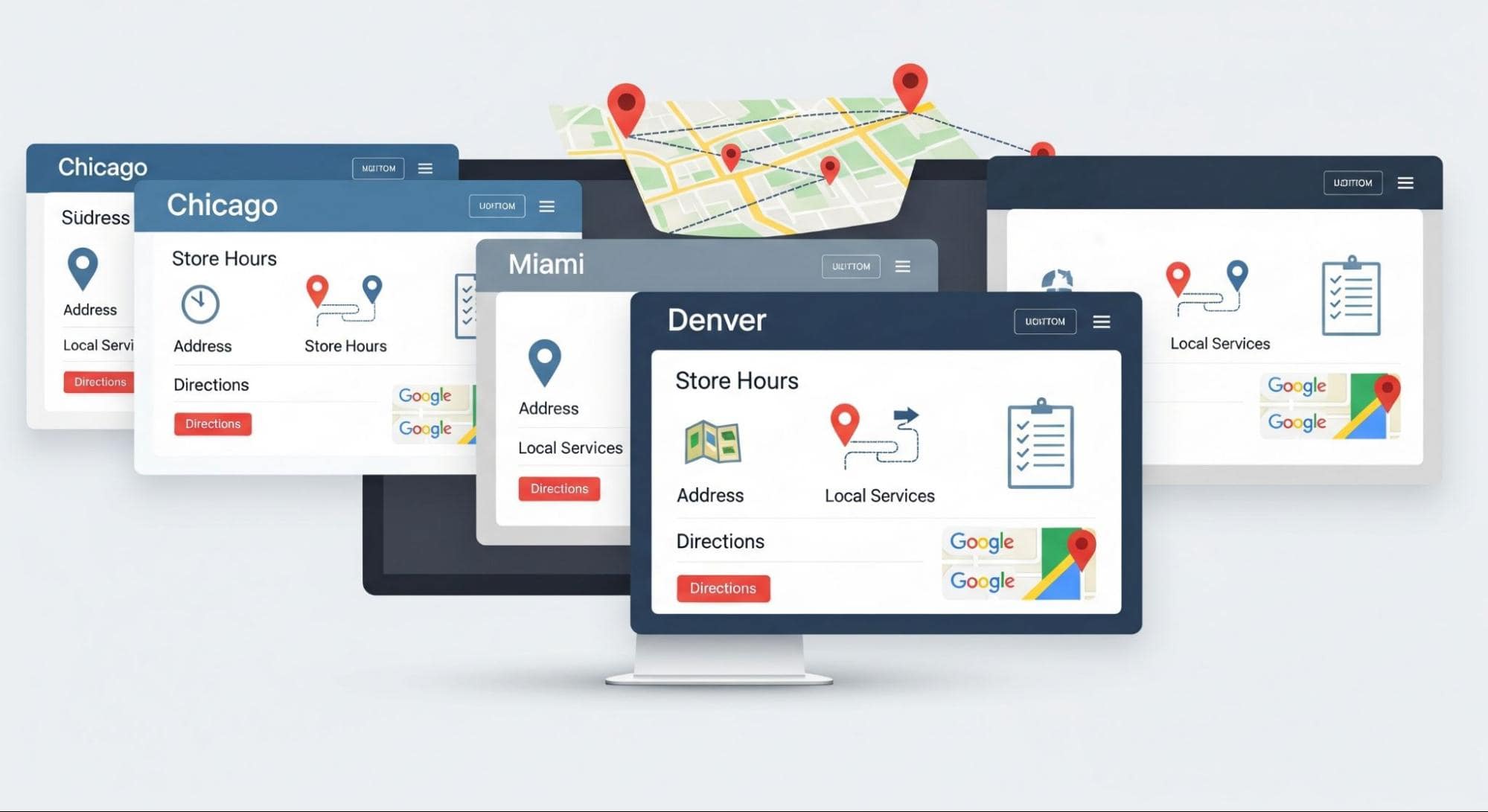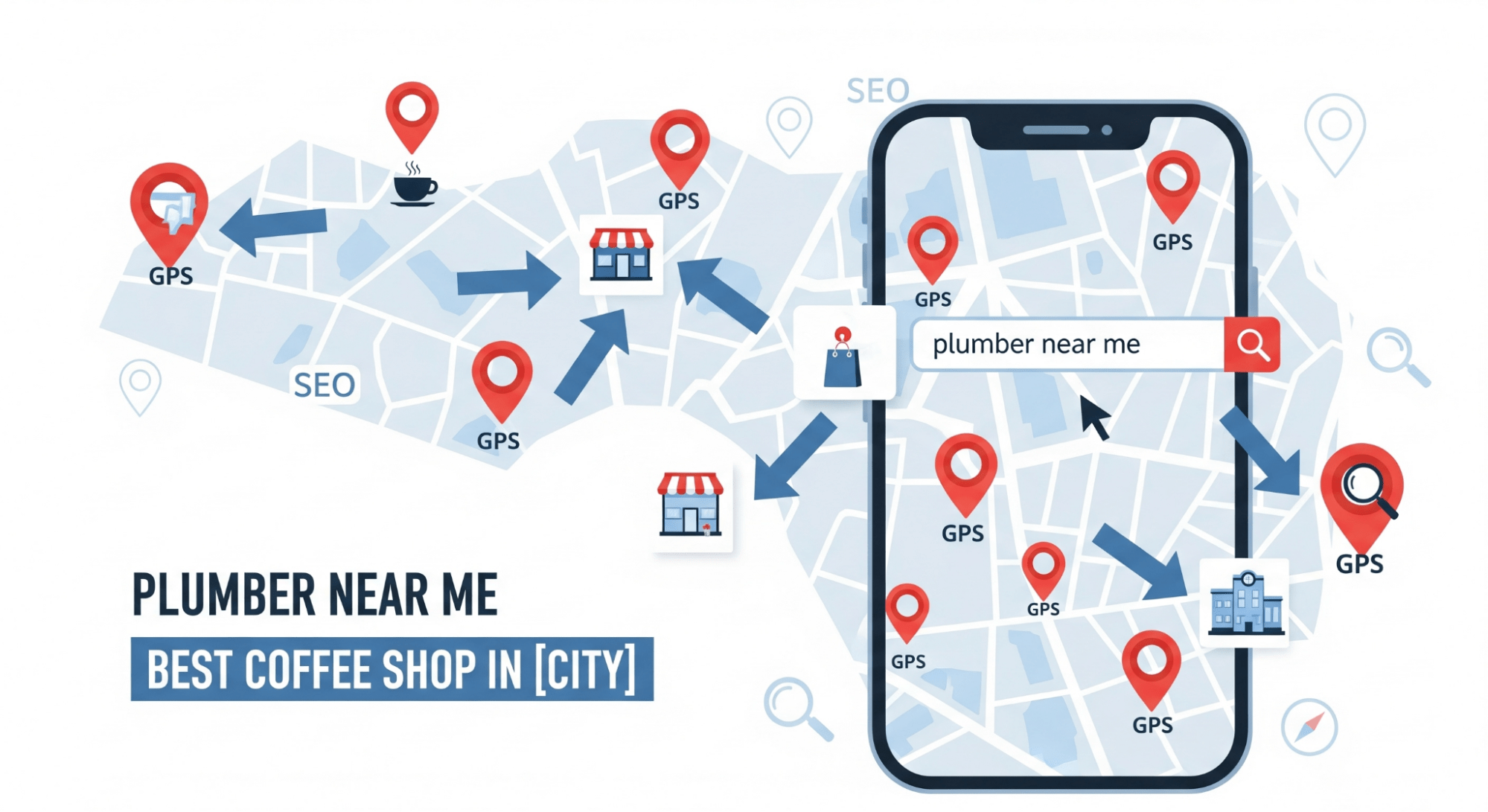Imagine a potential customer searches for your service in their city. They’re ready to buy, but instead of landing on your site, they find a competitor who speaks directly to their location. That’s the power of location pages.
Location pages are individual web pages designed to target specific geographic areas your business serves.
These pages help improve your visibility in local search, support Google Business Profile optimization, and create a more relevant, user-friendly experience for potential customers.
They also allow you to feature unique content per area, highlight local offers, and scale your SEO strategy across multiple locations. In short, they’re a critical part of building a strong local presence online.
In this article, we’ll explore the role of location pages in local SEO and how they can drive more visibility, trust, and conversions for your business.
Why Your Business Needs Location Pages: 10 SEO Benefits

Location pages are web pages built for each physical location a business serves. They include details like address, hours, services, directions, and other area-specific content.
While service pages talk about what you offer, location pages focus on where you offer it. Here's how they differ:
- Service Pages: Focus on a specific treatment, product, or offering (e.g., “Teeth Whitening” or “Plumbing Repair”).
- Location Pages: Focus on a city or area (e.g., “Plumbing Services in Austin, TX”).
Both are important, but location pages help you win local search.
Improve Local SEO Visibility
Search engines need clear signals to understand your business location. Location pages give them exactly that.
- They help your site rank for geo-targeted keywords like "SEO agency in Dallas" or "hair salon near Central London."
- Boosts your visibility in Google’s local pack, maps, and mobile searches.
- They enable better indexing for city- or neighborhood-specific queries.
This helps ensure that local customers find your business first, not your competitors.
Attract Hyper-Local Traffic

Location pages connect you directly with people nearby who are ready to take action.
- Capture search intent for “near me” or city-specific searches.
- Attract users actively looking for services in your immediate area.
- Drive more foot traffic to brick-and-mortar locations.
When users search with local intent, your business becomes the go-to choice.
Enhance User Experience
Your customers want answers fast, and location pages deliver.
- Include accurate contact info, operating hours, and embedded directions.
- Lower bounce rates by matching the user's search intent.
- Build credibility with personalized, location-specific content.
The easier it is for users to find what they need, the more likely they are to convert.
Support Google Business Profile Integration
Your website and your Google Business Profile (GBP) should tell the same story.
- Location pages improve consistency between GBP listings and your site.
- Boosts your visibility in local search rankings by reinforcing key location details.
- It allows you to embed maps, reviews, and even local citations directly on your site.
Google rewards consistency and so do your customers.
Enable Unique Content per Area
Every region has its own flavor. Your SEO should reflect that.
- Highlight area-specific services, promotions, or seasonal offers.
- Feature local testimonials, teams, or awards.
- Avoid duplicate content by customizing each page with unique value points.
Custom content per location helps you stay relevant and competitive.
Increase Conversion Rates
Location pages don't just bring visitors, they turn them into leads.
- Use custom calls-to-action tailored to local interests or events.
- Build trust with authentic local photos, staff bios, and customer reviews.
- Show you understand the community, which creates a stronger connection and higher-quality leads.
Local relevance leads to better results both online and offline.
Scale SEO Strategy Across Multiple Cities
If you're serving more than one area, a location page strategy makes it easy to grow.
- Use templates to replicate your strategy in new cities or regions.
- Create a consistent but localized experience for each service area.
- Manage multiple pages without sacrificing quality or SEO performance.
It's a scalable model that simplifies content creation and expands your digital reach.
Competitive Edge in Local Markets
Most businesses don’t go the extra mile. You can.
- Outrank competitors who rely on one generic service page.
- Show up in more localized searches with more entry points to your site.
- Build authority in each service area by speaking directly to that audience.
Location pages give you an unfair advantage in competitive markets.
Location Pages Are Non-Negotiable
If your business serves more than one location, then location pages are essential. They’re not just helpful, they’re one of the most powerful tools in your local SEO toolkit.
By building smart, optimized location pages, you improve your chances of being discovered, drive better conversions, and set yourself up for long-term growth. They offer one of the highest returns on investment when done right, and at RankEgg, we know exactly how to make that happen.
Conclusion
Location pages are more than just digital maps with directions they’re one of the most strategic tools you can use to grow locally and compete online. From improving your rankings in city-specific searches to offering a better experience for nearby customers, these pages help your business get discovered and trusted where it matters most.
If you're serious about local SEO, location pages are non-negotiable. They offer the kind of visibility, personalization, and scalability that generic service pages can’t. Whether you operate in two cities or twenty, investing in high-quality location pages will give you a clear edge and more customers through your door.
Frequently Asked Questions (FAQs)
Around 500-800 words, with detailed and unique content for each location. Include photos, directions, services, and contact info.
No. Duplicate content can hurt your rankings. Each location page should have unique content tailored to that area.
Yes. If you serve a specific area, a well-optimized location page helps target local intent keywords and increase visibility even without a storefront.
Create one for each service area you want to target, especially for cities or neighborhoods with high demand.
Yes. Location pages improve consistency and relevance, which supports better performance in the local map pack and search results.

